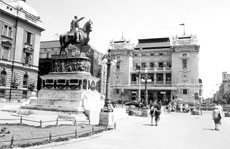Kosovo argues over peace

The square of Mihajia Obrenovica in Belgrade is a famous place for public events to occur like concerts, strikes, cultural activities and protests.
Since coming to power of a new government at the end of 2000, changes are noticeable toward the attitude and way of conduct on the problems in Kosovo.
The biggest move the government made was acceptance and acknowledgement on the existence of such problems in front of the international community. After that, the Yugoslavian government put forth an effort to enlighten and solve the war crimes committed in Ko-sovo. However, it demanded investigations of such on both sides.
Additionally, tolerance was campaigned, inviting both sides to a mutual understanding, facing and solving problems with rational conversation.
In Serbia, there is a big campaign from the side of non-governmental organizations, like Fund for Humanitarian Justice, directed toward facing the ethnic slaughtering committed by both sides in Kosovo. The numbers of missing people are still high regarding both Serbian and Albanian communities. However, neither side is ready to forgive nor forget the crimes committed. This avoidance of confronting real issues makes the situation even more difficult. In reality, neither side is ready to talk about finding an optimal solution.
Therefore, every organized meeting and efforts with a goal to open basic questions fails before it even starts. However, problems stay, like the roles and responsibilities of Serbian military police in Kosovo that committed crimes while following orders and performing their duties.
In the big picture, all of those debates, movements and war scripts have little to no influence in motivating people to escape the magic circle of national prefix in relation to other people.
The lack of an authentic political leader of the Serbs in Kosovo initiated many strategic combats by individuals over authority of the Serbs. Such situations position the problems of Kosovo to a new level.
Therefore, Serbs have to additionally face problems of their own individual conflicts. On one end there is Nebojsa Covic who represents the authority of Serbs in the name of the government as the vice president of the Parliament. However, to a small number of Serbs that still live in Kosovo, his representation is not important in regard to their real interests. On the other end, so-called political leaders of Kosovo are negotiating plans for a peaceful resolution of conflict on an everyday basis.
The Serbian community in Kosovo is realizing the only wise cooperation and mutual agreements with the Albanian community are the only and best recipe for a better future. With the help of the KFOR and UNMIK, Serbs are able to travel to school, jobs and shop for basic life needs to continue their survival. Simply, for them, life must go on.
Judging by information presented through the media, peaceful resolution will not come in the near future while both sides are living in the cities and villages where the borders are drawn according to nationality.
On the other hand, people are trying to stimulate peace with the organization of soccer games and campaigning tolerance toward accepting the past and looking into the future.
However, these are virtual realities not representing the real picture of the nationally colored minds of Kosovo’s Albanians and Serbs.
Another approach toward solution requires new conditions.
They believe that the core of separation and fighting between Serbs and Albanians is the result of differences in political policies and the solution is in talks without fighting for individual interests.
Twelve years ago, Milosevic came to power in Serbia and started leading the Serbs in Kosovo to believe it is a privilege to be a Serb, while at the same time being unacceptable by the Albanians.
Most Serbs do not even remember these events. Such short memory is one of the problems of the Serbian nation. For them, lies seem not to matter and be of no interest until they start to hurt. Eliminating autonomy of Kosovo and improper resolutions on educating the non-Serbian population became the rule of conduct toward the Albanian population.
These rules became a fuel for the extremes’ nationalism.
As seen, results were the creation of a Liberation Army of Kosovo fighting against the Serbian military and police. Both sides were carrying out their political system of destruction. Many things were revealed in the later process of reconciliation, bringing genocides and individuals in front of justice without imposing the verdicts. To fight against collective verdicts is left for those war leaders that remained alive.
However, the whole system ought to be blamed and reconstructed to never happen again.
Your donation will support the student journalists of Missouri Southern State University. Your contribution will allow us to purchase equipment and cover our annual website hosting costs.



























